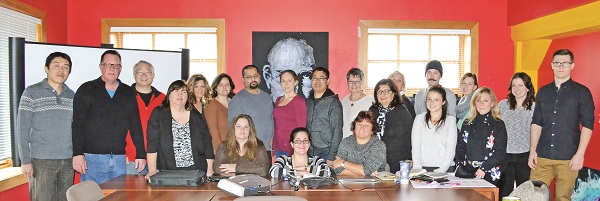General News » News
Aurora company harnesses skills of Syrian refugees
December 16, 2015 · 0 Comments

By Brock Weir
Pause for a moment and consider the entire City of Toronto, multiplied by two, trained professionals, skilled workers, all unemployed.
This is the reality in the Middle East where over six million people wait in refugee camps surrounding Syria. But one Aurora-based company is spearheading an initiative to build an extensive database of these skilled workers to connect them with hard-to-fill positions and even give them the opportunity to work remotely.
“In every country where you have that many people unemployed, there are some very, very good skillsets that are very hard to find, whether they be doctors or neuroscientists or software developers with specific skills,” says Debbie McGrath, CEO of HR.com.
“In many of these camps or adjacent communities, there are places where those people can go and work for Canadian or U.S.-based companies, or companies anywhere in the world. We have an individual in Lebanon, which has about two million refugees in that country or close by it. He would put those individuals to work, payroll them in a big warehouse he has, and they can be doing good work for companies in Canada or the U.S. Ultimately, you could bring those people in, but right now we can’t even identify the skills of the people in these refugee camps, but [through this], if we can bring in the right skilled people, we could help them get to work faster.”
Ms. McGrath was one of several Canadians moved by the images last week of the first Syrian refugees arriving at Pearson International Airport. It highlighted, she said, how lucky Canada is, as a country, to be able to welcome them and, in turn, how lucky they are to be coming to Canada and where they “will be successful in the long-term in integrating and being a vital part of our community.”
To this end, the resume database is just one initiative HR.com is spearheading to help give these refugees a hand. HR.com employees have come together to sponsor a family to come and settle in the Aurora area and have developed a free community-based app to encourage others – and provide resources to others – to do the same.
“What we built is a group functionality on Facebook that is private where you can communicate amongst a group of people who want to sponsor a family and keep them up to date on where the process sits,” says Ms. McGrath. “We have also built a registry system so you can go in and donate items or time. It has all the information you need to move into a house, the information to clothe a family and then you can customize it or personalize it based on the family you get.
“Part of the problem when you go through [the sponsorship process] is there is so much help and support through government sites and through various non-profits that are helping, but this information is not stored anywhere centrally. We are putting a lot of those great document into this app to kick-start a community so they don’t have to go and find that information directly.”
She adds she also hopes this inspires other companies within Aurora and beyond to consider stepping up to the plate to support a refugee family as a collective.
“One, it is the right thing to do and, two, we can influence and impact so may organizations to do the same things through our community of HR professionals,” she says. “For us, the first step was to just learn and understand the crisis that is happening, why it is happening, and learn the process of how to get involved and what you can do. It is about more than just raising the money to create a sustainable life for them in the first year. The success will be easy to measure: whether they can bring a family in and whether the family can be sustainable over a 12 month period.
“It is really about having people who really need help being successful and safe. If you can just envision that you are truly saving several lives. They are in so much danger in these refugee camps, they have a very low probability of being able to go home to Syria and they just need a hand. Somebody just needs to give them a break to help them. Although we are committed in Canada to taking in 25,000 there are 4 million people sitting in these camps. It is just such a small amount of people we can impact. Let’s start with that and get that done, and hopefully we can get more in. We are trying to get more education and awareness out there. People just really don’t understand the crisis and how we can help as Canadians.”
For more information, visit HR.com.











